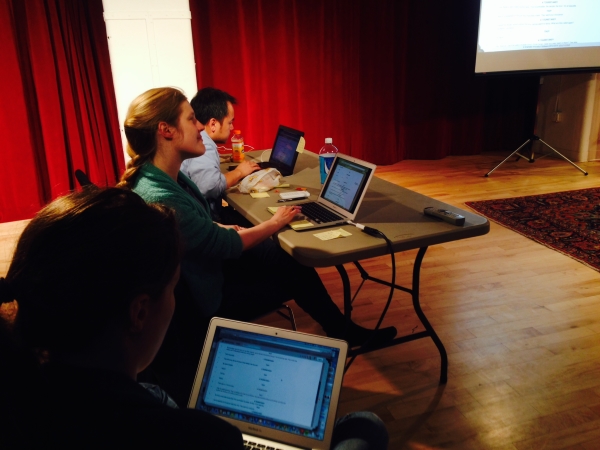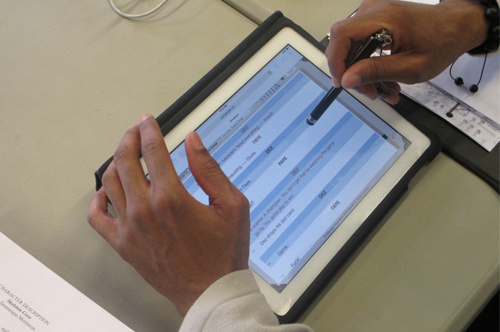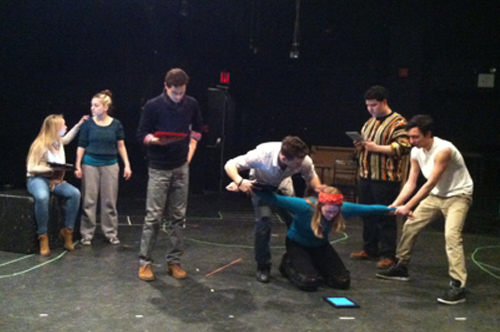Scriptopia and the Impending Death of the Paper Play Script

(© Zachary Stewart)
A rehearsal of a new play by Qui Nguyen is underway at the Lark Play Development Center. Nguyen is the artistic director of Vampire Cowboys, the Brooklyn-based action-adventure theater company that has brought to stage such titles as Fight Girl Battle World and She Kills Monsters. You might expect a rehearsal for one of Nguyen's plays to look like a roomful of babes brandishing blades. At the very least, you would probably see the actors leafing through heavily annotated scripts. But they're not doing either of those things. They're all staring at tablet computers, the glow of the screens radiating off their faces. This is a bad sign, right? Wrong.
The scripts are on those screens, and the latest round of rewrites is coming in. As if by magic, new words appear in red on the digital scripts to distinguish them from the older lines. The rehearsal continues without a stop. No running down to FedEx for copies. No messy scribbled-in lines in the margins. That's it. The actors are working with a new program called Scriptopia, and according to inventor Kay Matschullat, it's going to change the way we rehearse in the theater.

(© Gabriela Herman)
"Scriptopia came out of my experience as a director working on new plays," said Matschullat, recalling the countless hours of rehearsal time she's wasted distributing paper rewrites to actors. When you're working on a new play, the lines are subject to frequent alterations. This means that the production is at the mercy of a copy machine or the legibility of the actors' handwriting. Then there's the sheer cost in dead trees. "If you do a new play that's in the early stages, you're probably going to print out ten copies for the first reading that will never be used again," she said. It all represents a huge waste of time and money. In the age of digital technology, there had to be a better way.
Enter developer Andrew Mirsky, who helped turn Matschullat's problem into a solution: Officially launched on May 1, 2014, Scriptopia is a Web-based alternative to paper scripts. It's available on computers, tablets, and smartphones. "My students use it on their iPhones," said Matschullat, who teaches at NYU and Queens College. She uses Scriptopia for all of her directing projects now.
Scriptopia takes the familiar visual form of a traditional script: Sequential lines appear on screen with the stage directions in italics. It offers several different views, however, depending on whether you are a playwright, director, stage manager, or actor. Directors and stage managers can send notes to actors without disrupting the flow of the rehearsal. Actors can highlight lines and create their own notes, neatly printed in the margins. The director's cursor allows them to immediately jump to the director's position in the script, but they can also wander on their own if they need to run lines in another room. Playwrights can make instantaneous rewrites and cuts while storing all previous drafts in an easy-to-navigate filing system. "I like that it talks to Final Draft," said Nguyen, citing the favored word-processing program for American playwrights and screenwriters.
Matschullat admits that some artists hesitate to leap into this brave new world of paperless rehearsals. "Theater is a challenging, collaborative process. We want our rituals and guideposts and people to associate a paper script with that," she said. Of course, any good director knows that part of the job is gently pushing people beyond their comfort zones to get the best performance. Matschullat has used her directorial powers of persuasion to guide her casts into the digital age. "Nobody goes back to the paper script," she boasted.

(courtesy of Kay Matschullat)
One obvious advantage of going paperless: It is literally impossible to lose your script. Scriptopia is entirely Web-based. So even if you lose your computer, the work is preserved: Your lines, notes, and blocking will live on in the cloud. This also makes the job much easier for stage managers and resident directors who need to rehearse understudies and swings into long-running productions. Blocking and other rehearsal notes are easy to find and transfer from performer to performer. "This is what technology is really good at," Matschullat emphasized, "organizing things."
Of course, Scriptopia isn't an immediate panacea for theater: It's still mostly for straight plays rather than musicals. While the next iteration of Scriptopia will allow actors and directors to store sheet music PDFs, it won't have the same editing and note-taking functionality it does with straight text. It's also optimized for work in the rehearsal room, meaning stage managers using Scriptopia will probably have to fall back on a big binder of cues on a paper script during the tech process. "I would hope we could make this go all the way through tech," Matschullat said, already envisioning Scriptopia 2.0 and 3.0.
Ultimately, Matschullat isn't looking to completely transform the play-making process. Rather, she's hoping to make the time-honored process smoother and more practical for more people: "I love the theater and I feel like we have particular challenges right now with resources and time," she said. "Scriptopia supports artists and it saves trees and toner." Just as the worlds of print journalism and publishing are transitioning to something more cost-effective and eco-friendly, the stage looks poised to begin that journey as well.

(courtesy of Kay Matschullat)










